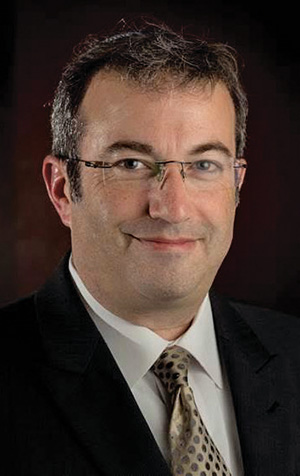

On Wednesday, Yeshiva University’s Board of Trustees announced the formal election and appointment of Rabbi Dr. Ari Berman as the fifth president of Yeshiva University. He was the only candidate selected by the university’s search committee to replace President Richard Joel, who has served since 2003 and had been expected to continue to helm the institution through 2018. The Jewish Link reported on this news in September, indicating that President Joel had agreed to step down earlier if his replacement was amenable; Rabbi Berman, who will have to move his family back from Israel, where he has lived since 2008, is now set to officially begin his tenure in July 2017.
As news of his board election broke, Rabbi Berman spoke to The Jewish Link and shared thoughts on becoming head of the flagship institution of Modern Orthodoxy. He related that his parents met while his father served as president of Yeshiva College’s student body and his mother was president of the same group at Stern. “I am literally a product of Yeshiva University,” he joked. In addition to that, Rabbi Berman is a graduate of Yeshiva University’s high school for boys (MTA), undergraduate, graduate and rabbinic schools. In fact, the only degree he has that is not from a YU affiliated institution is from Hebrew University, where he earned a doctorate in Jewish Thought after having made aliyah with his family.
After spending eight years in Israel, teaching and working as an administrator at the university level, Rabbi Berman shared that he considers that his deep knowledge and understanding of YU as an institution along with his experiences working with a wide swath of modern orthodoxy in modern Israel have given him the tools required to embark on a unique transformation. He indicated that the nature of the changing world and the diversity of offerings now available to yeshiva day school students, who, in earlier times, might have chosen YU by rote, have shown that there is much work to be done. “The world of past [YU] university presidents, of the 70s and 80s, is very different than the 90s and 2000s, and even different from the world of today. We need to deal with the current reality and explain the Yeshiva University differential and what we’re about, today.”
“We are in a position now to think about who we are,” said Rabbi Berman, particularly referring to the financial challenges that YU has faced over the last decade. “There is a difference between a turnaround and a transformation. In the situation of a turnaround, what you are trying to do is cut some expenses, add some income and balance the budget, and that’s enough. You know you’ve done your job.” However, with a transformation, he explained, it’s not just about the finances, it’s about the mission and the vision.
“I think that Yeshiva is not just in a situation of a turnaround; it’s also in a position of transformation. It’s somewhat inherent in what Yeshiva University is about. Torah U’Madda (Torah combined with secular knowledge) is about integrating the world around us into our Jewish lives.
“Because the world around us is changing, we need to change. We need to reimagine. We need to think about what are the opportunities, what are the challenges of the current world, and how do we integrate that into our Jewish lives,” he said.
“That is a very exciting project that we need to embark on, as we think about our future. It’s very tied, of course, to the financial piece. The Mishna in Avot says, famously, ‘Im ein kemach, ein Torah; without sustenance, there’s no means to support the Torah.’ The same Mishna also says, ‘im ein Torah, ein kemach; If you don’t have the sense of Torah related to your current reality, you are not going to be supported either.’ So Yeshiva University needs to approach its finances in a clear-eyed, strategically responsible way, and think about that and work on that, but at the same time, we have a much more ambitious project. We’re not just talking about the means, we are also talking about the mission; the means and the mission are inextricably linked,” said Rabbi Berman.
“This is a thought project. We need to do the work of leading this conversation and then fleshing out the details and then implementing them into our educational model. We need to reimagine the mission; we need to reenvision,” said Rabbi Berman.
“Rabbi Berman is a dynamic and inspirational leader, scholar and educator,” said YU Chairman Moshael J. Straus, who led the Presidential Selection Committee. “He possesses a deep, lifelong commitment to our mission and is a superb choice to lead Yeshiva University forward with excellence.”
Rabbi Berman is the current head of Hechal Shlomo—Jewish Heritage Center in Jerusalem, “which is one of the most historically significant religious institutions in the modern state of Israel,” said Rabbi Berman. A release from Yeshiva University said that Rabbi Berman has led a transformation of the historic organization into an international Modern Orthodox center for Jewish life, learning and leadership. He also serves as a lecturer of rabbinic literature in Herzog College’s Department of Jewish Studies and sits on its Executive Leadership Council, the governing body that establishes policies and sets direction for all major issues regarding the operation of the college.
Prior to moving to Israel, Rabbi Berman served as rabbi of The Jewish Center in New York City
Simultaneous with his pulpit at the Jewish Center, Rabbi Berman served as an instructor of Talmud in the Irving I. Stone Beit Midrash Program at Yeshiva College. He is married to Anita Berman, and they have five children.
“Rabbi Berman lives the values of Yeshiva University,” said President Joel. “His optimism, scholarship and abilities as a speaker and writer will serve YU well as it rises to its next level.”
By Elizabeth Kratz









